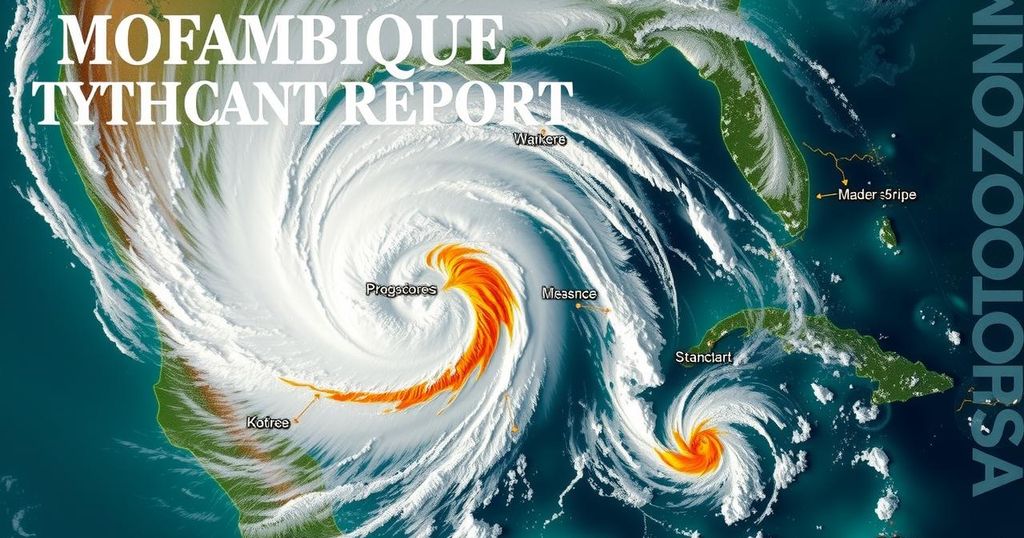Mozambique’s Response to Tropical Cyclone Chido: Challenges and Humanitarian Efforts

Tropical Cyclone Chido struck Mozambique on December 15, 2024, mainly affecting Cabo Delgado and Niassa, causing significant humanitarian challenges. Limited accommodation centers have been established, with many families living in insecure situations. Efforts are underway by CCCM partners to enhance living conditions and coordinate essential services amid increasing needs.
On December 15, 2024, Intense Tropical Cyclone Chido made landfall in the Mecúfi district of Mozambique, impacting the southern areas of Cabo Delgado and Niassa as well as northern parts of Nampula. The cyclone caused extensive infrastructural damage and resulted in loss of life, injuries, and significant displacement, exacerbating already existing humanitarian needs in both urban and rural locales. The CCCM Cluster partners, including the International Organization for Migration (IOM), United Nations High Commissioner for Refugees (UNHCR), ASMOG, and Pronanac, have been actively coordinating with local authorities and humanitarian agencies to address these urgent challenges from December 14 to 30, 2024.
Following the disaster, only four official accommodation centers were established by the National Institute for Disaster Risk Reduction Management (INGD) in Cabo Delgado province (three in Pemba district and one in Chiúre). Assessments by site management teams revealed that several schools in the Chiúre, Metuge, and Mecúfi districts are currently sheltering affected populations at night while serving as reception hubs for essential services during the day. However, these facilities have not been formally recognized as accommodation centers, creating a clear need for enhanced collaboration among CCCM teams, local authorities, and community committees to properly designate these locations for effective humanitarian assistance.
Many families are still forced to sleep outdoors, in neighboring yards, barracks, or makeshift shelters, while attempting to reconstruct their homes. In addition to the immediate necessities of food, non-food items, water, sanitation, hygiene, and healthcare, there is a critical demand for improving living conditions. Essential measures encompass the provision of lighting solutions to ensure safety at night, reinforcing coordination mechanisms, and setting up basic services such as handwashing stations and communal toilets at reception sites to mitigate long waiting periods for aid—especially for individuals with specific needs. Moreover, the infrastructure in certain neighborhoods demands reorganization, including the enhancement of access roads and the reconstruction of vital community facilities previously damaged, such as information and communication centers, through tools allocation and cash-for-work initiatives.
As UNHCR and Pronanac have stepped back from managing three accommodation centers in Pemba, IOM remains dedicated to providing support via mobile teams in collaboration with local authorities at the sites housing displaced families. Overall, ongoing efforts aim to foster dignity and improve living conditions for those affected by Cyclone Chido, which are crucial in the wake of this disaster.
The context surrounding Tropical Cyclone Chido’s impact in December 2024 highlights the vulnerability of communities in Mozambique to natural disasters. The cyclone wreaked havoc particularly in Cabo Delgado and neighboring regions, leading to extensive damage, loss of life, and increased humanitarian needs. Previous displacement sites further complicated the situation as many individuals were already in precarious living conditions before the cyclone hit. The response by humanitarian organizations and local authorities is critical in not only addressing immediate needs but also establishing frameworks for sustainable recovery and future disaster resilience.
The response to the impact of Tropical Cyclone Chido underscores a significant humanitarian crisis in Mozambique, necessitating a collaborative approach to effectively assist the affected populations. With the establishment of only a few accommodation centers and ongoing challenges faced by displaced families, there is an urgent need for improved living conditions, coordination, and the provision of essential services. The roles of CCCM partners and local authorities are vital in facilitating comprehensive assistance that addresses both immediate and long-term recovery needs.
Original Source: reliefweb.int






